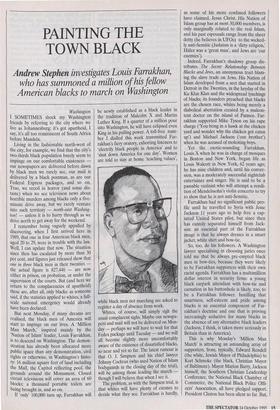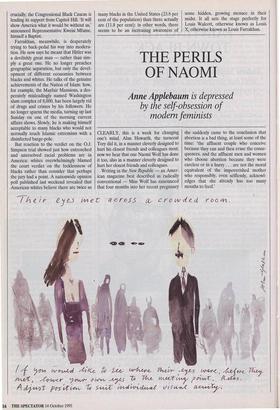PAINTING THE TOWN BLACK
Andrew Stephen investigates Louis Farrakhan,
who has summoned a million of his fellow American blacks to march on Washington
Washington I SOMETIMES shock my Washington friends by referring to the city where we live as Johannesburg: it's got apartheid, I say, it's all too reminiscent of South Africa before Mandela.
Living in the fashionable north-west of the city, for example, we find that the city's two-thirds black population barely seem to impinge on our comfortable existences our newspapers are delivered before dawn by black men we rarely see, our mail is delivered by a black postman, as are our Federal Express packages, and so on. True, we recoil in horror (and some dis- taste) when we see television news about horrible murders among blacks only a five- minute drive away, but we rarely venture into such territory — north-east Washing- ton! — unless it is to hurry through as we drive north to get away for the weekend.
I remember being vaguely appalled by discovering, when I first arrived here in 1989, that one in four American black men, aged 20 to 29, were in trouble with the law. Well, I can update that now. The situation since then has escalated by more than 30 per cent, and figures just released show that one in three black men in their twenties the actual figure is 827,440 — are now either in prison, on probation, or under the supervision of the courts. But (and here we return to the complacencies of apartheid) these are, after all, only blacks: as someone said, if the statistics applied to whites, a full- scale national emergency would already have been declared.
But next Monday, if many dreams are realised, the black men of America will start to impinge on our lives. A 'Million Man March,' inspired mainly by the `Nation of Islam' leader, Louis Farrakhan, is to descend on Washington. The demon- stration has already been allocated more public space than any demonstration, civil rights or otherwise, in Washington's histo- ry: 16 million square feet of land including the Mall, the Capitol reflecting pool, the grounds around the Monument. Closed circuit televisions will cover an area of 60 blocks; a thousand portable toilets are being brought in, and so on.
If 'only' 100,000 turn up, Farrakhan will be newly established as a black leader in the tradition of Malcolm X and Martin Luther King. If a quarter of a million pour into Washington, he will have eclipsed even King in his pulling power. A toll-free num- ber I dialled this week transmitted Far- rakhan's fiery oratory, exhorting listeners to `electrify black people in America' and to `shut down America for one day'. Women are told to stay at home 'teaching values', while black men not marching are asked to register a day of absence from work. Whites, of course, will simply sigh the usual complacent sighs. Maybe our newspa- pers and mail will not be delivered on Mon- day — perhaps we will have to wait for that Fedex package until Tuesday — and we will all become slightly more uncomfortably aware of the existence of dissatisfied blacks, so near and yet so far. The latest rumour is that 0. J. Simpson and his chief lawyer Johnny Cochran (who used Nation of Islam bodyguards in the closing day of the trial), will be among those leading the march though I will believe that when I see it. The problem, as with the Simpson trial, is that whites will have plenty of excuses to deride what they see. Farrakhan is hardly, as some of his more confused followers have claimed, Jesus Christ. His Nation of Islam group has at most 30,000 members, is only marginally related to the real Islam, and his past espousals range from the sheer dotty (he believes in UFOs) to the wicked- ly anti-Semitic (Judaism is a `dirty religion,' Hitler was a 'great man', and Jews are 'our enemies').
Indeed, Farrakhan's shadowy group dis- tributes The Secret Relationship Between Blacks and Jews, an anonymous tract blam- ing the slave trade on Jews. His Nation of Islam developed from a sect that started in Detroit in the Twenties, in the heyday of the Ku Klux Klan and the widespread lynchings of blacks; its founders preached that blacks are the chosen race, whites being merely a diabolical aberration created by a malcon- tent doctor on the island of Patmos. Far- rakhan supported Mike Tyson on his rape charge (`You bring in a hawk at the chicken yard and wonder why the chicken got eaten up') and Michael Jackson (`our brother') when he was accused of molesting boys.
Yet the exotic-sounding Farrakhan, Louis X when he was in charge of mosques in Boston and New York, began life as Louis Walcott in New York, 62 years ago; he has nine children and, until his conver- sion, was a moderately successful nightclub entertainer and singer. He is said to be a passable violinist who will attempt a rendi- tion of Mendelssohn's violin concerto to try to show that he is not anti-Semitic.
Farrakhan had no significant public pro- file until he travelled to Syria with Jesse Jackson 11 years ago to help free a cap- tured United States pilot, but since then has cannily separated himself from Jack- son: an essential part of the Farrakhan image is that he always dresses in a smart jacket, white shirt and bow-tie.
So, too, do his followers. A Washington lawyer specialising in choosing juries once told me that he always pre-empted black men in bow-ties, because they were likely to be Farrakhan supporters with their own racist agenda. Farrakhan has a multimillion dollar interest in security firms: a young black carpark attendant with bow-tie and carnation in his buttonhole is likely, too, to be a Farrakhan follower. Instilling that smartness, self-esteem and pride among blacks is an essential component of Far- rakhan's doctrine and one that is proving increasingly seductive for many blacks in the absence of any alternative black leaders (Jackson, I think, is taken more seriously in Britain than in America).
This is why Monday's 'Million Man March' is attracting an astounding array of supporters, from, typically, Edward Rendell (the white, Jewish Mayor of Philadelphia) to Kurt Schmoke (the black, Christian Mayor of Baltimore). Mayor Marion Barry, Jackson himself, the Southern Christian Leadership Conference, the National Black Chamber of Commerce, the National Black Police Offi- cers' Association, all have pledged support. President Clinton has been silent so far. But, crucially, the Congressional Black Caucus is lending its support from Capitol Hill. 'It will show America what it would be without us,' announced Reprensentative Kweisi Mfume, himself a Baptist.
Farrakhan, meanwhile, is desperately trying to back-pedal his way into modera- tion. He now says he meant that Hitler was a devilishly great man — rather than sim- ply a great one. He no longer preaches geographic separation, but only the devel- opment of different economies between blacks and whites. He talks of the genuine achievements of the Nation of Islam: how, for example, the Mayfair Mansions, a des- perately misleadingly named Washington slum complex of 8,000, has been largely rid of drugs and crimes by his followers. He no longer spurns the media, turning up last Sunday on one of the morning current affairs shows. Slowly, he is making himself acceptable to many blacks who would not normally touch Islamic extremism with a disinfected barge-pole.
But reaction to the verdict on the O.J. Simpson trial showed just how entrenched and unresolved racial problems are in America: whites overwhelmingly blamed the court verdict on the fecklessness of blacks rather than consider that perhaps the jury had a point. A nationwide opinion poll published last weekend revealed that American whites believe there are twice as many blacks in the United States (23.8 per cent of the population) than there actually are (11.8 per cent): in other words, there seems to be an increasing awareness of some hidden, growing menace in their midst. It all sets the stage perfectly for Louis Walcott, otherwise known as Louis X, otherwise known as Louis Farrakhan.











































































 Previous page
Previous page